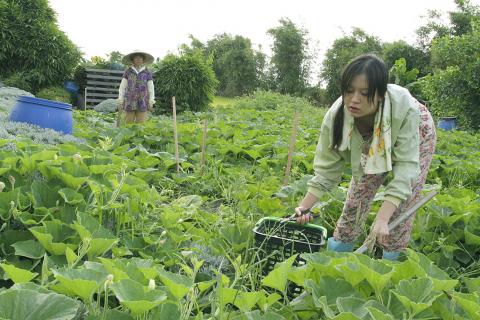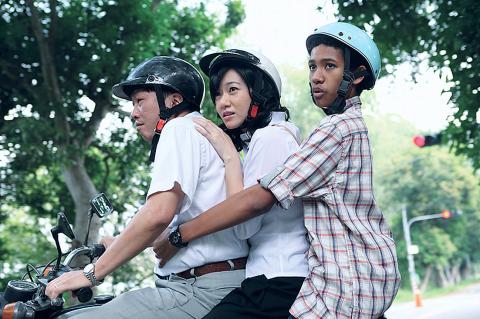A ccording to statistics compiled by the Ministry of the Interior (內政部), the number of married immigrants in Taiwan exceeded 450,000 last year. Yet despite their increasing presence, these foreign spouses, most of whom come from China, Vietnam and Indonesia, remain largely invisible in mainstream Taiwanese society and the mass media.
Four films currently showing at the SPOT — Taipei Film House (光點台北), under the appellation of We Are Family: Festival of the New Immigrants (內人/外人新移民系列電影), shed light on these newcomers.
The idea to make films about immigrants first came to film producer Khan Lee (李崗) five years ago. With funding and support from the National Immigration Agency (移民署) and Videoland Inc (緯來電視網), the project evolved into four feature-length movies by four Taiwanese directors.

Photo courtesy of Zeus International Production
In My Little Honey Moon (野蓮香), director Cheng Yu-chieh (鄭有傑) explores his interest in the themes of migration and diaspora, which he first addressed in his debut feature Do Over (一年之初, 2006). The film tells the tale of a family drama centering on Joan, played by Vietnamese actress Helen Thanh Dao, a woman who made her home in the Hakka town of Meinong (美濃) in Greater Kaohsiung.
Joan has dedicated herself to her husband’s family for the six years since she moved to Taiwan. She masters Hakka and Mandarin, yet her husband can’t speak a word of Vietnamese, and her mother-in-law, with her occasional racist comments, has never made Joan feel part of the family. The Vietnamese wife and mother soon develops a friendship with her reticent daughter’s teacher Sun, played by songstress and actor Yangui Yasiungu of Tsou tribe (鄒族), who, as a person of Aboriginal descent, understands too well what it feels like to be an outsider.
Sticking to straight-forward storytelling, the film is less striking than the director’s previous works, but its approach to its characters, especially the husband, played by theater actor Chen Zhu-sheng (陳竹昇), whose ego is wounded and pride suffers because he can barely support his family with his organic farming business, is sincere.

Photo courtesy of Zeus International Production
In The Golden Child (金孫), seasoned female director Chou She-wei (周旭薇) adopts a blackly comic and slightly absurd tone in portraying Vietnamese woman Jinzhi’s (Esther Liu, 劉品言) struggle to fulfill the traditional role of female in a Hoklo village in Taichung. One of the many eloquent moments in the film that challenge conventional ideas of family involves Jinzhi’s sister’s half-black and half-Vietnamese baby boy, who Jinzhi eventually raises as her own, frolicking in front of the portraits of the husband’s ancestors.
Technically polished and emotionally absorbing, The Happy Life of Debbie (黛比的幸福生活) tells the bitter-sweet tale of Debbie (Jade Chou, 周幼婷) from Indonesia, who works as a coffee bean picker in Gukeng Township (古坑), Yunlin County, to support her unemployed husband Lu (Chao Cheng-ping, 趙正平) and her teenage son Han, played by first-time actor Nur Najman Ade Putra. Their life is interrupted when a suited Indonesian man shows up at the door, threatening to lay bare the family’s long-held secret.
In the film, her second feature, director Fu Tien-yu (傅天余) demonstrates she possesses surprisingly mature storytelling skills. The movie opens with a nearly 10-minute scene that neatly shows Fu’s talents: Debbie wakes up from dream about her lush hometown. It takes her a second to realize she is now in a place far away from home. On her way to deliver coffee beans, she receives two phone calls. In the first, she is told that her drunken husband is in trouble again at work; in the other she is asked to pick up her son, who has been bullied at school. Debbie stops at a crossroads, not knowing which way to go.

Photo courtesy of Zeus International Production
Meanwhile, award-winning television director Chen Hui-ling’s (陳慧翎) The Moonlight in Jilin (吉林的月光) tells a rather uneven tale about the plight of Chinese woman Weiwei (Yin Shin, 尹馨), who comes all the way to subtropical Taiwan from her snow-capped hometown of Jilin only to find the man she has married is a criminal on the run.
The series runs until May 25 at SPOT — Taipei Film House (光點台北), 18, Zhongshan N Rd Sec 2, Taipei City (台北市中山北路二段18號). All films have English subtitles. A screening schedule can be found at www.spot.org.tw.

Photo courtesy of Zeus International Production

Taiwan has next to no political engagement in Myanmar, either with the ruling military junta nor the dozens of armed groups who’ve in the last five years taken over around two-thirds of the nation’s territory in a sprawling, patchwork civil war. But early last month, the leader of one relatively minor Burmese revolutionary faction, General Nerdah Bomya, who is also an alleged war criminal, made a low key visit to Taipei, where he met with a member of President William Lai’s (賴清德) staff, a retired Taiwanese military official and several academics. “I feel like Taiwan is a good example of

March 2 to March 8 Gunfire rang out along the shore of the frontline island of Lieyu (烈嶼) on a foggy afternoon on March 7, 1987. By the time it was over, about 20 unarmed Vietnamese refugees — men, women, elderly and children — were dead. They were hastily buried, followed by decades of silence. Months later, opposition politicians and journalists tried to uncover what had happened, but conflicting accounts only deepened the confusion. One version suggested that government troops had mistakenly killed their own operatives attempting to return home from Vietnam. The military maintained that the

Before the last section of the round-the-island railway was electrified, one old blue train still chugged back and forth between Pingtung County’s Fangliao (枋寮) and Taitung (台東) stations once a day. It was so slow, was so hot (it had no air conditioning) and covered such a short distance, that the low fare still failed to attract many riders. This relic of the past was finally retired when the South Link Line was fully electrified on Dec. 23, 2020. A wave of nostalgia surrounded the termination of the Ordinary Train service, as these train carriages had been in use for decades

Lori Sepich smoked for years and sometimes skipped taking her blood pressure medicine. But she never thought she’d have a heart attack. The possibility “just wasn’t registering with me,” said the 64-year-old from Memphis, Tennessee, who suffered two of them 13 years apart. She’s far from alone. More than 60 million women in the US live with cardiovascular disease, which includes heart disease as well as stroke, heart failure and atrial fibrillation. And despite the myth that heart attacks mostly strike men, women are vulnerable too. Overall in the US, 1 in 5 women dies of cardiovascular disease each year, 37,000 of them